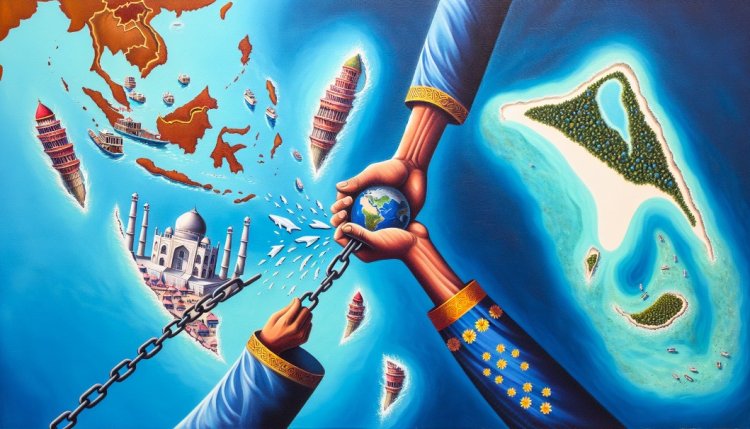Diplomatic Row Between India and Maldives: A Detailed Analysis
Sun, sand, and...strain? Unravel the complexities of the recent diplomatic row between India and Maldives. Dive into the causes, consequences, and potential pathways toward resolution in this in-depth analysis.

Introduction
The diplomatic row between India and the Maldives has been making headlines recently, with tensions escalating between the neighboring countries. This incident has highlighted the importance of diplomatic relations between neighboring countries and the impact that derogatory comments can have on bilateral relations.
The diplomatic row began after derogatory comments were made by a Maldivian minister following Indian Prime Minister Modi's visit to Lakshadweep. Although the minister has since deleted her tweets, the incident has sparked a heated exchange between the two nations.
The derogatory comments made by the Minister have caused outrage among the Maldivian political class, with calls for action to be taken against public officials who disrespect heads of state and high officials of friendly countries. The Maldives National Party has also condemned the remarks, referring to them as racist and derogatory.
The incident has had a significant impact on bilateral relations between India and the Maldives. India has officially shared its concerns with the Maldives government, leading to the suspension of three deputy ministers by the Maldivian government. The Maldives government has issued an official statement clarifying that the minister's opinions are personal and do not represent the views of the government. However, it has also emphasized that relevant government authorities will not hesitate to take action against derogatory remarks in the future.
The diplomatic row between India and the Maldives is a reminder of the importance of maintaining strong diplomatic relations between neighboring countries. Such relations are crucial for peaceful coexistence and cooperation on various issues of mutual interest.
Background of the Incident
The diplomatic row between India and the Maldives can be traced back to a series of events that occurred recently. It all began with Indian Prime Minister Modi's visit to Lakshadweep, which drew attention and sparked discussions among the Maldivian political class.
During this time, a Maldivian minister named Mariam Shuna made derogatory comments about India and Prime Minister Modi on Twitter. Although the minister has since deleted her tweets, the incident triggered a diplomatic row between the two countries.
The derogatory remarks made by the minister caused outrage and condemnation from the Maldivian political class. Farris, the president of the MDES Reform movement, called for action to be taken against public officials who disrespect heads of state and high officials of friendly countries. The Maldives National Party also posted on social media, condemning the remarks as racist and derogatory.
In response to the incident, India officially shared its concerns with the Maldives government. This led to the suspension of three deputy ministers by the Maldivian government as a first step. The Maldives government issued an official statement clarifying that the minister's opinions were personal and did not represent the views of the government. However, they also emphasized that action would be taken against derogatory remarks in the future.
The diplomatic row between India and the Maldives highlights the importance of maintaining strong diplomatic relations between neighboring countries. It serves as a reminder of the need for respectful communication and the impact that derogatory comments can have on bilateral relations. Peaceful coexistence and cooperation between neighboring countries are crucial for various mutual interests.
Response from the Maldives Government
The Maldives government has issued an official statement in response to the recent diplomatic row with India. The statement emphasizes that the opinions expressed by the Maldivian Minister, Mariam Shuna, are personal and do not represent the views of the government.
The government has clarified that derogatory comments made by the minister are in no way reflective of the official stance of the Maldives government. It has also highlighted the importance of maintaining strong diplomatic relations with neighboring countries.
The Maldives government has acknowledged the concerns raised by India and has taken immediate action. Three deputy ministers, including Mariam Shuna, have been suspended from their positions as a first step in addressing the issue.
The government has reaffirmed its commitment to take action against derogatory remarks in the future. It has stated that relevant government authorities will not hesitate to take appropriate measures to ensure that such incidents are not repeated.
The derogatory remarks made by the minister have caused outrage among the Maldivian political class as well. The Maldives National Party has condemned the remarks, describing them as racist and derogatory.
The suspension of three deputy ministers reflects the seriousness with which the government is addressing the issue. It serves as a clear message that such behavior will not be tolerated, especially when it comes to disrespecting heads of state and high officials of friendly countries.
The incident serves as a reminder of the importance of maintaining strong diplomatic relations between neighboring countries. It highlights the need for respectful communication and the consequences of derogatory comments on bilateral relations.
The Maldives government is committed to peaceful coexistence and cooperation with India and other neighboring countries. It recognises the importance of mutual respect and understanding in fostering strong diplomatic ties.
Impact on Bilateral Relations
The recent diplomatic row between India and the Maldives has had significant consequences for bilateral relations between the two countries. Here are some key points to consider:
-
India has officially shared its concerns with the Maldives government following the derogatory comments made by a Maldivian minister. This demonstrates the seriousness with which India views the issue and its commitment to resolving the dispute.
-
There has been a reported downturn in ties between India and the Maldives as a result of this incident. The derogatory remarks made by the minister have strained the relationship and caused tension between the two countries.
-
The anti-India stance of the Maldivian government has further exacerbated the situation. The government's refusal to renew the hydrographic agreement with the Indian Navy and calls for the removal of Indian troops have added to the strain in bilateral relations.
-
The potential consequences for future relations between India and the Maldives are uncertain. The suspension of three deputy ministers by the Maldivian government is a clear indication that action is being taken, but it remains to be seen whether this will lead to a resolution or further escalate the situation.
The diplomatic row between India and the Maldives has had a significant impact on bilateral relations. The strained ties, anti-India stance, and potential consequences for the future are all factors that need to be considered as the situation continues to unfold.
Analysis of Government Actions
The recent diplomatic row between India and the Maldives has led to significant actions taken by the government in response to the derogatory comments made by a Maldivian minister. This section will analyze the government's actions and discuss the domestic and international implications of the incident.
The significance of suspending three deputy ministers
The suspension of three deputy ministers by the Maldivian government is a significant action that demonstrates the seriousness with which the government views the derogatory remarks. By suspending these officials, the government is sending a clear message that such behavior will not be tolerated, especially when it comes to disrespecting heads of state and high officials of friendly countries.
Evaluation of the government's response
The government's response to the incident has been prompt and decisive. By officially sharing its concerns with the Maldives government and taking immediate action to suspend the deputy ministers, India has shown its commitment to resolving the dispute and maintaining strong diplomatic relations with its neighboring country.
The government has also clarified that the derogatory comments made by the minister do not represent the views of the Maldives government. This statement emphasizes the government's commitment to maintaining respectful communication and preserving bilateral relations.
Domestic and international implications
The diplomatic row between India and the Maldives has had both domestic and international implications. Domestically, the incident has caused outrage among the Maldivian political class, with calls for action against public officials who disrespect heads of state. This indicates a demand for accountability and respect within the country.
Internationally, the strained relations between India and the Maldives have raised concerns. The anti-India stance of the Maldivian government, including the refusal to renew the hydrographic agreement with the Indian Navy and calls for the removal of Indian troops, has added to the tension. This has implications for future relations between the two countries and may require a reset in bilateral relations.
Calls for a reset in bilateral relations
The recent incident and its implications have led to calls for a reset in bilateral relations between India and the Maldives. The suspension of the deputy ministers by the Maldivian government can be seen as a step towards addressing the issue and de-escalating the situation.
However, it remains to be seen whether this action will lead to a resolution or further escalate the situation. The upcoming visit of the Maldivian president to China will be closely watched to determine the direction of bilateral relations.
A reset in bilateral relations would be crucial for maintaining peaceful coexistence and cooperation on various issues of mutual interest. It would require respectful communication, mutual respect, and understanding between the two countries.
Future Outlook
The diplomatic row between India and the Maldives highlights the importance of resolving this issue in the future. It is crucial to address the tension and find a way to reconcile to maintain strong diplomatic relations between the two countries.
Importance of Resolving the Diplomatic Row
The diplomatic row has had a significant impact on bilateral relations between India and the Maldives. It is important to resolve this issue to restore trust and cooperation between the two neighboring countries. Peaceful coexistence and cooperation are crucial for addressing mutual interests and maintaining regional stability.
Possible Steps towards Reconciliation
To resolve the diplomatic row, both India and the Maldives need to engage in dialogue and diplomatic negotiations. Both parties need to express their concerns, clarify misunderstandings, and find common ground for reconciliation. This could involve high-level talks, diplomatic visits, and mediation by neutral parties.
Impact on Regional Dynamics
The diplomatic row between India and the Maldives has had an impact on regional dynamics. It has strained the relationship between the two countries and added to the existing tension in the region. The anti-India stance of the Maldivian government and its refusal to renew agreements with India has further complicated the situation. Resolving this issue will contribute to regional stability and cooperation.
Role of International Interventions
International interventions can play a role in resolving the diplomatic row between India and the Maldives. Mediation and facilitation by neutral parties, such as neighboring countries or international organizations, can help bring the two countries together and facilitate a peaceful resolution. International pressure and diplomatic efforts can encourage both parties to engage in constructive dialogue and find a way to reconcile.
In conclusion, resolving the diplomatic row between India and the Maldives is of utmost importance. Taking steps towards reconciliation, addressing regional dynamics, and allowing for international interventions can contribute to a positive future outlook for bilateral relations between the two countries.
Conclusion
The diplomatic row between India and the Maldives has had significant implications for bilateral relations between the two countries. The derogatory comments made by a Maldivian minister have strained the relationship and caused tension. India has officially shared its concerns with the Maldives government, leading to the suspension of three deputy ministers as a first step in addressing the issue.
The importance of diplomatic dialogue and cooperation between neighboring countries cannot be overstated. Maintaining friendly relations is crucial for peaceful coexistence and cooperation on various issues of mutual interest. The incident serves as a reminder of the need for respectful communication and the impact that derogatory comments can have on bilateral relations.
It is important to resolve the diplomatic row and work towards a resolution. The summary of the incident and its implications highlight the need for both countries to engage in meaningful dialogue and find common ground. Both India and the Maldives should prioritize the importance of maintaining strong diplomatic relations and work towards restoring trust and cooperation.
Hope remains for a resolution and improved bilateral ties. A reset in relations would be beneficial for both countries, fostering peaceful coexistence and cooperation. It requires respectful communication, mutual respect, and understanding. International interventions and mediation by neutral parties may also play a role in facilitating a peaceful resolution.
In conclusion, it is crucial to address the tension and find a way to reconcile to maintain strong diplomatic relations between India and the Maldives. The hope is for a resolution to the diplomatic row and a positive future outlook for bilateral ties.
FAQ
What were the derogatory comments made by the Maldivian minister?
The Maldivian Minister made disparaging remarks about India and Narendra Modi, the Indian Prime Minister. Although the specific content of the comments has been deleted, they were described as racist and derogatory.
How did the incident impact relations between the two countries?
The incident has had a significant impact on bilateral relations between India and the Maldives. It has strained the relationship and caused tension between the two countries. The anti-India stance of the Maldivian government, including the refusal to renew agreements with India, has further exacerbated the situation.
What actions did the Maldives government take in response?
The Maldives government has taken action in response to the derogatory comments made by the minister. Three deputy ministers, including the minister herself, have been suspended from their positions. This action demonstrates the government's seriousness in addressing the issue and its commitment to maintaining strong diplomatic relations.
What are the potential consequences for future relations?
The potential consequences for future relations between India and the Maldives are uncertain. The suspension of the deputy ministers is a clear indication that action is being taken. However, it remains to be seen whether this will lead to a resolution or further escalate the situation. The upcoming visit of the Maldivian president to China will be closely watched to determine the direction of bilateral relations.
What steps can be taken to resolve the diplomatic row?
To resolve the diplomatic row, both India and the Maldives need to engage in dialogue and diplomatic negotiations. Both parties need to express their concerns, clarify misunderstandings, and find common ground for reconciliation. This could involve high-level talks, diplomatic visits, and mediation by neutral parties. International interventions can also play a role in facilitating a peaceful resolution.



 admin
admin 










